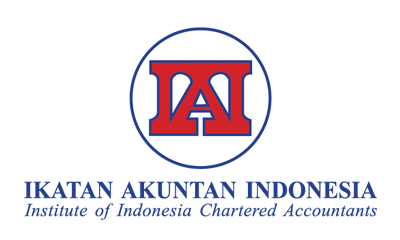Anteseden Pertumbuhan Ekonomi: Pendapatan atau Belanja Daerah?
Abstract
Keywords
Full Text:
PDFReferences
Al-Fawwaz, T. M. (2015) ‘The Impact of Government Expenditures on Economic Growth in Jordan (1980-2013)’, International Business Research, 9(1), p. 99. doi: 10.5539/ibr.v9n1p99.
Al-Sharif, B. (2019) ‘The Role of Government Capital Expenditures in Economic Growth in Jordan’, International Journal of Business and Economics Research, 8(2), p. 69. doi: 10.11648/j.ijber.20190802.15.
Ali, S. et al. (2013) ‘The composition of public expenditures and economic growth: Evidence from Pakistan’, International Journal of Social Economics, 40(11), pp. 1010–1022. doi: 10.1108/IJSE-05-2012-0081.
Altunc, O. F. and Aydın, C. (2013) ‘The Relationship between Optimal Size of Government and Economic Growth: Empirical Evidence from Turkey, Romania and Bulgaria’, Procedia - Social and Behavioral Sciences, 92(October), pp. 66–75. doi: 10.1016/j.sbspro.2013.08.639.
Arwakom, K., Falah, S. and Wijaya, A. H. C. (2017) ‘an Analysis of Regional Economic Growth and Capital Expenditure on Self-Generated Revenue in Supiori Regency’, Jurnal Kajian Ekonomi & Keuangan Daerah, 1(3), pp. 117–144.
Attari, M. I. J. and Javed, A. Y. (2013) ‘Inflation, Economic Growth and Government Expenditure of Pakistan: 1980-2010’, Procedia Economics and Finance, 5(13), pp. 58–67. doi: 10.1016/s2212-5671(13)00010-5.
Butkiewicz, J. L. and Yanikkaya, H. (2011) ‘Institutions and the impact of government spending on growth’, Journal of Applied Economics, 14(2), pp. 319–341. doi: 10.1016/S1514-0326(11)60017-2.
Chirwa, T. and Odhiambo, N. (2016) ‘What Drives Long-Run Economic Growth? Empirical Evidence from South Africa’, Economia Internazionale / International Economics, 69(4), pp. 429–456.
Christia, A. M. and Ispriyarso, B. (2019) ‘DESENTRALISASI FISKAL DAN OTONOMI DAERAH Di INDONESIA’, Law Reform, 15(1), p. 149. doi: 10.14710/lr.v15i1.23360.
DudzeviÄiÅ«tÄ—, G., Å imelytÄ—, A. and LiuÄvaitienÄ—, A. (2018) ‘Government expenditure and economic growth in the European Union countries’, International Journal of Social Economics, 45(2), pp. 372–386. doi: 10.1108/IJSE-12-2016-0365.
Fanggidae, H. K. and Manafe, M. W. N. (2019) ‘Evaluasi anggaran belanja sebagai alat pengendalian kebijakan pembangunan pada Pemerintah Daerah’, Ekopem: Jurnal Ekonomi …, 4(2), pp. 45–52. Available at: http://jurnal.unimor.ac.id/JEP/article/view/162.
fasanya, I. and Fasanya, I. (2013) ‘Public Expenditure and Economic Growth in Nigeria: Evidence from Auto-Regressive Distributed Lag Specification’, Zagreb International Review of Economics and Business, 16(1), pp. 79–92.
Hanif, I. (2014) ‘Fiscal Autonomy and Economic Growth Nexus: Empirical Evidence from Pakistan.’, Pakistan Journal of Social Sciences (PJSS), 34(2), pp. 767–780.
Hanif, I., Wallace, S. and Gago-de-Santos, P. (2020) ‘Economic Growth by Means of Fiscal Decentralization: An Empirical Study for Federal Developing Countries’, SAGE Open, 10(4). doi: 10.1177/2158244020968088.
Hasnul, A. G. (2015) ‘Munich Personal RePEc Archive The effects of government expenditure on economic growth : the case of Malaysia’, Munich Personal RePEc Archive, (71254).
Jati, K. W., Ilmiyana, W. and Sari, M. P. (2019) ‘the Effects of Pad, Dau, and Employee Expenses on Capital Expenditures With Population Density As a Moderating Variable’, Jurnal Dinamika Akuntansi, 11(2), pp. 132–140. doi: 10.15294/jda.v11i2.21004.
Kimaro, E. L., Keong, C. C. and Sea, L. L. (2017) ‘Government Expenditure, Efficiency and Economic Growth: A Panel Analysis of Sub Saharan African Low Income Countries’, African Journal of Economic Review, 5(2), pp. 34–54.
Kiminyei, F. K. (2018) ‘The Nexus between Tax Revenue and Government Expenditure in Kenya’, International Journal of Economics & Management Sciences, 07(05). doi: 10.4172/2162-6359.1000546.
Lojanica, N. (2015) ‘Government Expenditure and Government Revenue – The Causality on the Example of the Republic of Serbia’, Management International Conference, (May 2015), pp. 79–90.
Makreshanska-Mladenovska, S. and Petrevski, G. (2019) ‘Fiscal decentralisation and government size: Evidence from a panel of european countries’, Hacienda Publica Espanola, 229(2), pp. 33–58. doi: 10.7866/hpe-rpe.19.2.2.
Manafe, M. W. N., Ena, Z. and Adu, S. S. (2019) ‘FISCAL STRESS: Studi Kasus Pemda Provinsi Nusa Tenggara Timur’, Wahana, 21(2), pp. 125–135. doi: 10.35591/whn.v21i2.152.
Maurya, R. and Singh, B. P. (2017) ‘Nexus of Economic Growth and Public Expenditure in India’, Indian Journal of Economics and Development, 13(1), p. 165. doi: 10.5958/2322-0430.2017.00022.1.
Mehrara, M. et al. (2013) ‘Government Expenditure and Economic Growth in Iran’, International Letters of Social and Humanistic Sciences, 11, pp. 76–83. doi: 10.18052/www.scipress.com/ilshs.11.76.
Mulyani, H. (2016) ‘The Relationship of Local Own Revenues and General Fund Allocation on Capital Expenditure of Local Government’, pp. 163–166. doi: 10.2991/gcbme-16.2016.29.
Muzdalifah, M. and Siregar, S. (2018) ‘the Impact of Capital Expenditure, Investment, and Labor Force on Economic Growth in South Kalimantan’, UNEJ e-Proceeding, (November), pp. 126–130.
Nyasha, S. and Odhiambo, N. M. (2019) ‘The Impact of Public Expenditure on Economic Growth: A Review of International Literature’, Folia Oeconomica Stetinensia, 19(2), pp. 81–101. doi: 10.2478/foli-2019-0015.
Okoye, L. U. et al. (2019) ‘Government Expenditure and Economic Growth : the Case of Nigeria’, (June), pp. 1184–1194.
Segun, O. M. and O. A., A. (2015) ‘Measuring the Impact of Public Expenditure on Economic Growth in Nigeria’, Journal of Social Science Studies, 2(2), p. 46. doi: 10.5296/jsss.v2i2.5626.
Susetyo, D. et al. (2018) ‘Impact of Capital Expenditure and Public Utility Customers to Economic Development of District-City in Sumatra-Indonesia’, International Journal of Economics and Financial Issues, 8(1), pp. 126–135. Available at: http:%0Awww.econjournals.com.
Udoka, C. O. and Anyingang, R. A. (2015) ‘The Effect of Public Expenditure on the Growth and Development of Nigerian Economy (1980-2012)’, International Review of Management and Business Research, 4(3), pp. 823–834.
Yilgör, M., Ertugrul, C. and Celepcioglu, M. E. (2012) ‘The effect of public expenditure on economic growth: Turkey example’, Investment Management and Financial Innovations, 9(2), pp. 193–202.
DOI: https://doi.org/10.35591/wahana.v24i2.351
Wahana: Jurnal Ekonomi, Manajemen dan Akuntansi
ISSN : 2685-1415 (Online) | 1410-8224 (Print)
Published by Pusat Penelitian dan Pengabdian Masyarakat Politeknik YKPN Yogyakarta.
Jl. Gagak Rimang No. 2-4 Balapan, Yogyakarta 55222
Phone (0274) 560159, 562317, 513413, 563516 Fax. (0274) 561591
 This work is licensed under a Creative Commons Attribution-ShareAlike 4.0 International License.
This work is licensed under a Creative Commons Attribution-ShareAlike 4.0 International License.













